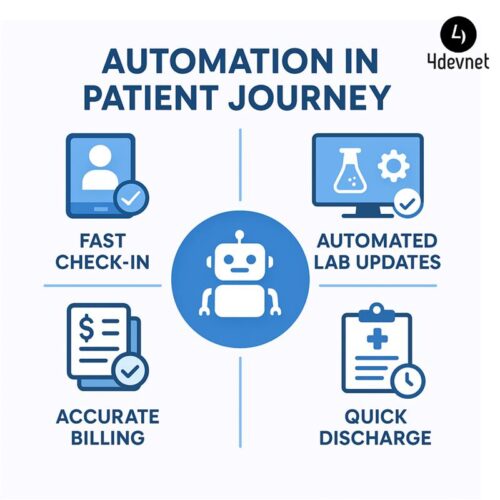Healthcare Automation with RPA: A Complete Guide for Modern Hospitals
In today’s fast-evolving healthcare environment, hospitals and medical institutions face increasing pressure to deliver faster, safer, and more coordinated patient care. From administrative overload to rising patient expectations, the demand for efficiency has never been higher. Robotic Process Automation (RPA) has emerged as a transformative technology that enables healthcare providers to automate routine tasks, reduce errors, and create a more seamless patient journey.
Across global healthcare markets—such as India, USA, UK, Germany, Canada, UAE, Singapore, and Saudi Arabia—the adoption of RPA is accelerating. Healthcare networks and hospitals in major cities including Mumbai, Delhi, Bengaluru, Hyderabad, Chennai, Pune, Kochi, Ahmedabad, New York, London, Dubai, Berlin, Toronto, and Singapore City are investing in automation to elevate operational efficiency and empower clinical teams with more time for patient-centric activities.
This blog explores how RPA is redefining healthcare operations, boosting compliance, and significantly improving patient care outcomes.
What Is RPA in Healthcare?
Robotic Process Automation in healthcare refers to the use of software robots to carry out repetitive, rule-driven processes that typically consume substantial manual effort. These bots imitate human actions such as clicking, reading, validating, and entering data across various healthcare applications—including EHR/EMR platforms, HIS systems, insurance portals, laboratory systems, and billing platforms.
By automating labor-intensive tasks, RPA frees up clinical and administrative teams, enabling them to focus on decision-making, patient communication, and treatment delivery.
Why Healthcare Organisations Need RPA Today
1. Growing Administrative Workload
Healthcare institutions handle enormous volumes of paperwork—from registrations and insurance verifications to billing and reporting. This burden slows down care delivery and leaves staff overwhelmed.
2. Increasing Patient Expectations for Digital Experiences
In the digital-first era, patients expect quick confirmations, online access to reports, faster check-ins, and seamless communication channels. RPA helps healthcare facilities meet these rising expectations.
3. High Operational Costs
Manual administrative tasks increase labour costs. RPA offers a cost-effective alternative that delivers long-term operational efficiencies.
4. Strict Compliance & Data Security Requirements
Healthcare organisations must adhere to global compliance frameworks such as HIPAA, GDPR, NHS guidelines, NABH, and country-specific data protection laws. RPA ensures uniform documentation, audit-friendly processes, and enhanced security.
Top RPA Use Cases in Healthcare
1. Automated Patient Appointment Management
Bots manage:
- Appointment scheduling
- Rescheduling
- Automated email/SMS confirmations
- Patient reminders
- Doctor availability checks
This reduces patient waiting time and improves the flow of outpatient departments.
2. Insurance & Claims Process Automation
Healthcare facilities in India, UAE, USA, and Europe deal with complex insurance and claims workflows. RPA automates:
- Eligibility verification
- Claim filing
- Document validation
- Follow-ups
- Denial management
This ensures faster reimbursements and reduces financial leakages.
3. Electronic Health Record (EHR) Data Management
Updating patient information manually is time-consuming and prone to errors. RPA enables:
- Automated data entry
- Lab result uploads
- Medical history updates
- Document categorization
Doctors and nurses receive complete and accurate patient data instantly.
4. Diagnostic Laboratory Workflow Automation
From test order processing to report generation, RPA accelerates the diagnostic cycle. Labs in cities such as Mumbai, Dubai, Singapore, London, and New York already use RPA to manage high test volumes efficiently.
5. Hospital Billing & Revenue Cycle Automation
RPA ensures:
- Accurate billing codes
- Error-free invoices
- Faster payment cycles
- Reduced human errors
- Streamlined revenue cycle
This directly contributes to improved cash flow for healthcare providers.
6. Inventory, Pharmacy & Supply Chain Management
Bots monitor stock levels, track expiry dates, auto-generate purchase orders, and maintain pharmacy databases. This avoids stockouts and optimises procurement costs.
7. Automated Patient Onboarding (ADT)
Admission, Discharge, and Transfer (ADT) workflows become more organised with RPA. Data is synchronized across systems, improving bed allocation, discharge summaries, and patient flow.
8. Compliance Management & Reporting
RPA ensures accurate record-keeping, timely documentation, and automated generation of compliance reports. This is particularly crucial for multi-branch hospitals operating across countries.
Key Benefits of RPA in Healthcare
Superior Patient Experience
With quicker processes, accurate reports, and faster turnarounds, patients receive a smoother and more satisfying healthcare journey.
Cost Savings & Operational Efficiency
RPA reduces administrative overhead, minimises human errors, and accelerates critical processes.
Enhanced Accuracy in Critical Processes
Bots perform tasks with consistent accuracy, eliminating risks associated with manual entry.
Improved Staff Productivity
Medical staff can devote more time to critical tasks such as diagnosis, care delivery, and research.
Data Security & Regulatory Compliance
Automated workflows ensure secure handling of patient records and maintain audit-ready documentation.
Scalability Across Multi-Location Healthcare Groups
RPA can be quickly deployed across clinics, labs, and hospitals—whether in Delhi, London, Dubai, Toronto, or Singapore—without major infrastructure changes.
Real-World Applications Based on Regions
India
Hospitals in Mumbai, Bengaluru, Hyderabad, Delhi, Chennai, Pune, Kochi, and Ahmedabad are leveraging RPA for insurance processing, OPD management, and diagnostic automation.
UAE & Middle East
Healthcare systems in Dubai, Abu Dhabi, Riyadh, Doha use RPA to support smart healthcare initiatives and improve patient engagement.
United States & Canada
Large hospital networks adopt RPA to reduce administrative costs, tackle claim denials, and enhance documentation accuracy.
United Kingdom & Europe
Hospitals in London, Manchester, Berlin, Paris, and Amsterdam rely on RPA for compliance management and operational efficiency.
Asia-Pacific (Singapore, Malaysia, Hong Kong)
These markets are prioritizing patient experience and precision-based automation in diagnostics and telehealth.
Future Trends: Where RPA in Healthcare Is Heading
The future of healthcare automation involves the integration of:
- AI-powered decision-making systems
- Machine learning for predictive insights
- Conversational AI for patient triage
- Chatbots for 24/7 appointment assistance
- Computer vision for medical imaging workflows
- Hyperautomation combining RPA + AI + analytics
These advancements will transform healthcare into a more proactive, data-driven, and patient-centric ecosystem.
Conclusion
RPA is revolutionising the global healthcare industry by improving accuracy, enhancing operational efficiency, and elevating patient care standards. From patient scheduling and billing to diagnostics, inventory, and compliance management, automation brings significant value to both small clinics and large hospital networks.
Whether you are in India, UAE, USA, UK, Singapore, Europe, or Canada, adopting RPA enables healthcare institutions to reduce workload, eliminate inefficiencies, increase compliance, and deliver exceptional patient experiences.
Healthcare providers that embrace automation today will build resilient, future-ready systems capable of handling rising patient demands and delivering superior care outcomes.


